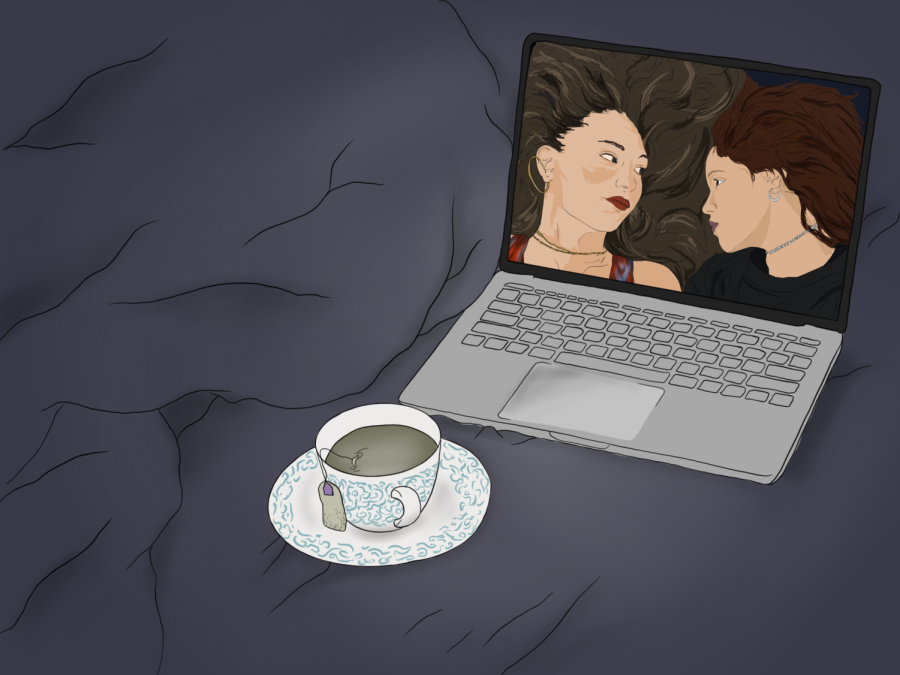Off the Radar: ‘The Fallout’
Introducing “Off the Radar,” a new weekly series from the Film & TV editors that surveys overlooked films available to students for free via NYU’s streaming partnerships.
In the Gen Z film “The Fallout,” Vada (Jenna Ortega) and Mia (Maddie Ziegler) bond over the trauma of a school shooting. The film is available for free via NYU’s streaming partnerships. (Staff Illustration by Aaliya Luthra)
February 28, 2022
An unlikely pair bond together following a traumatic school shooting in HBO’s new original film “The Fallout.” Vada (Jenna Ortega), a chill and unapologetic tomboy, would normally make fun of picture-perfect influencer Mia Reed (Maddie Ziegler). That is, until the two find themselves in the bathroom at the exact same time their classmate opens fire in the hallway outside.
Megan Park’s directorial and screenwriting debut, “The Fallout” captures the trauma following a school shooting in a way that Generation Z can find relatable. Though Park herself is 35, her writing and directing are realistic in depicting how normal teenagers would act. She captures familiar adolescent moments such as Vada’s sister’s TikTok dances, drinking and awkward relationships with parents without overplaying the moments too much.
Park also touches on issues including sexuality and light substance abuse in a realistic manner that neither glorifies nor downplays them. Her debut film captures the Gen Z voice. More importantly, she is able to accurately capture the perspective of a survivor of intense trauma.
As an 18-year-old, I find many films don’t accurately portray adolescent trauma. It seems that most of them revolve around the incident itself rather than the aftermath, and the aftermath is always portrayed as a linear healing process.
“The Fallout” argues that healing looks different for everyone. Vada’s character displays a slow recovery process in which she hides from her trauma rather than facing it. Her best friend Nick (Will Ropp) immediately jumps into action following the shooting: calling for reforms, organizing protests and demanding change. The different ways that people choose to heal from trauma was well-portrayed in this film, as Park is able to capture how these differences created a rift in their friendship.
Another highlight of Park’s writing is how she shows Vada’s awkward but relatable relationship with her therapist Anna (Shailene Woodley). Following traumatizing events, many people are unsure whether they should even get help, which is understandable — exposing your life to a total stranger can be uncomfortable and scary. If Vada’s mother (Julie Bowen) hadn’t encouraged her to see a therapist, she never would have sought out help, but in the end, therapy plays an important role in her healing journey. Hopefully, those who watch Park’s film will feel more comfortable seeking out help after viewing this film.
“The Fallout” also accurately depicts the awkwardness of first love and exploring one’s sexuality. As if Vada’s friendship with Mia weren’t awkward enough, with the two being polar opposites, Vada realizes she has feelings for Mia and she spirals even more. Figuring out who you are is hard enough — unresolved trauma only makes it more overwhelming. This becomes evident through Vada’s outbursts. Indeed, Ortega’s performance plays a huge role in the success of Megan Park’s story telling. She is able to make her character relatable without overdoing it. Many times during the movie, I thought that we were the same person.
Park does a great job of exploring Vada’s relationships with her family throughout the movie. She shows the shift between Vada’s family dynamics very realistically, and her relationship with her sister Amelia reminded me exactly of my relationship with my own sister. I hope this film will help viewers navigate the process of communicating with their own families when they are faced with tough situations of their own.
Contact Shreya Wankhade at [email protected].
























































































































































